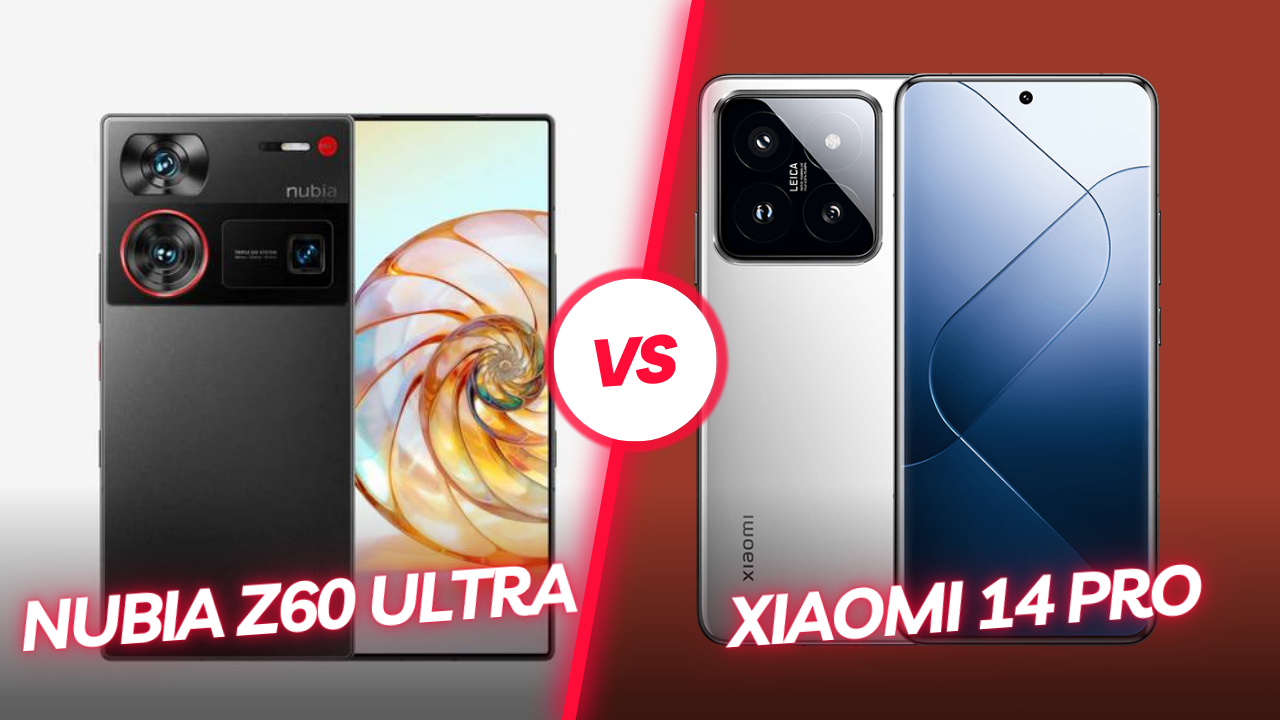

In the vast world of high-end phones, the Nubia Z60 Ultra and Xiaomi 14 Pro have emerged as strong contenders, each bringing their own set of enticing features to the table. In this in-depth comparison, we’ll explore the key aspects of these two smartphones, from designs to performance, to help you make an informed choice based on your specific needs.
The Nubia Z60 Ultra stands out for its original and attractive design. With a virtually bezel-less screen and a front camera neatly integrated underneath, it offers a modern aesthetic. Available in special colour variants, including the Van Gogh-inspired Starry Night, the Z60 Ultra combines originality and elegance.
The thinner, lighter Xiaomi 14 Pro is compact and durable, with a titanium frame. Although it may appear more sober, its top-of-the-range design and IP68 certification guarantee resistance to drops and scratches.
The verdict: The choice between the two depends on your aesthetic preferences, with the Z60 Ultra offering a more original design while the Xiaomi 14 Pro focuses on sobriety and robustness.
With a 6.8-inch screen, the Z60 Ultra offers an immersive experience, although its Full HD+ resolution is slightly lower than that of the Xiaomi 14 Pro. The front-facing camera under the screen maintains a sharp display surface.
The Xiaomi 14 Pro impresses with its 6.73-inch Quad HD+ AMOLED display. LTPO technology ensures an adaptive refresh rate of 120Hz, 3000 nits of brightness and HDR10+ certification, delivering exceptional visual quality.
Verdict: Although the Z60 Ultra offers a larger screen, the Xiaomi 14 Pro wins out in terms of quality with superior resolution and advanced features.
Powered by Snapdragon 8 Gen 3, the Z60 Ultra offers up to 24GB of RAM and 1TB of UFS 4.0 internal storage. Running Android 14, it offers optimised performance for a smooth experience.
Equipped with the same chipset, the Xiaomi 14 Pro offers up to 16GB of RAM. With a highly personalised user interface, it also offers powerful performance under Android 14.
Verdict: Both smartphones offer top-level performance, with the choice depending on your specific storage and RAM requirements.
With a three-camera setup including a 64MP periscope, the Z60 Ultra excels at photography. However, the lack of a variable focal aperture can be noted.
Designed in collaboration with Leica, the Xiaomi 14 Pro offers a trio of sensors at the back, including a new 50MP Sony LYT-900 with variable focal aperture.
Verdict: While both offer impressive camera set-ups, the choice depends on your feature preferences.
With a massive 6000mAh battery, the Z60 Ultra offers exceptional battery life. However, it probably charges less quickly than the Xiaomi 14 Pro.
Despite having less battery capacity, the Xiaomi 14 Pro makes up for it with faster charging, with the added bonus of wireless charging.
Verdict: If battery life is crucial, the Z60 Ultra is ideal, but if fast charging is your priority, the Xiaomi 14 Pro is the choice.
Prices vary by region, but generally the Nubia Z60 Ultra is slightly more expensive, starting at around €680, while the Xiaomi 14 Pro offers a more affordable alternative, starting at around €650.
Verdict: The Xiaomi 14 Pro offers excellent value for money, which can be a deciding factor.
Ultimately, the choice between the Nubia Z60 Ultra and the Xiaomi 14 Pro depends on your specific preferences. If original design, exceptional battery life and an immersive experience are your priorities, the Z60 Ultra is the perfect choice. On the other hand, if you’re looking for superior display quality, powerful performance and fast charging, the Xiaomi 14 Pro will meet your expectations. Whichever you choose, these two smartphones offer a high-end experience that should satisfy discerning users.
Related :
The Windows 11 update error can occur for several reasons, such as corrupted files, connectivity issues, or conflicts with third-party…
The "You don’t currently have permission to access this folder" error often appears when you try to access a folder…
When developing Flutter applications, it's common to encounter errors related to SDK version compatibility. One of these common errors is…
During the installation of Windows, you may encounter an error indicating that the selected disk is not compatible with the…
The error "Windows could not start the Windows Update service on the local computer" occurs when the operating system fails…
The Windows Update Service is essential for keeping your system up to date with the latest security and performance improvements.…